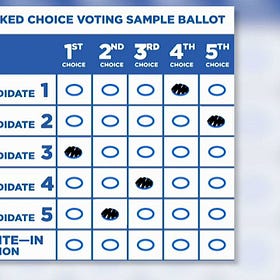Whackadoodle Civics: Is it a problem of the chicken or the egg?
A Whackadoodle civics discussion in which my student suggests that we are struggling through a chicken or the egg dilemma when it comes to politics.

She was fiddling with the strap of her backpack pact, which meant there was something on her mind.
“What’s up? I asked.
She looked at me uncertainly, “I know that you’ve told me about a million times that we don’t live in a democracy,” she said breathlessly, then continued as if by rote, “We live in a democratic republic, where the rights we have and the benefits we receive depend a great deal on our zip code because each state has its own constitution and its own set of laws. I totally get all that.”
“I’m glad you’ve been paying attention.”
“Yeah, but I still have a question.”
I propped my chin on my hands and said, “I’m listening.”
“Well, you’ve also told me that you see major problems in our voting system. Things like gerrymandering, the Citizens United decision, the gutting of the Voting Rights Act, the Electoral College, and a bunch of laws that make voting harder for some more than others. Stuff like that.”
I nodded my head silently, waiting for her question.
“Plus, you’ve written articles explaining how you would fix stuff. Like that one about Ranked Choice Voting.”
“Which one are you referring to?” I asked. “I think I’ve written a couple of them.”
She pulled out her iPad, and did a quick search. “This one,” she said, turning the iPad towards me.
Ranked Choice Voting: What is it, and why do we need it?
Let’s pretend for a moment that I teach at an after school program, and today is movie day. I have thirty students, and five movies. How do we decide which movie to watch? We vote of course! After all, it’s the American way.
“Oh yeah,” I grinned. “That was a fun one.”
“Anyway,” she said, stuffing her iPad back inside her backpack. “It all seems to me to be a kind of chicken and egg situation.”
“Chicken and egg situation?”
“You know. Which came first the chicken or the egg?” She repeated. “I mean, you can’t change the laws unless you change the law makers, and you can’t change the law makers unless you change the laws.”
“Ah, I see where you’re getting. It seems like a pretty overwhelming dilemma. But you know,” I added, “There is an answer to the causality dilemma of the chicken and the egg. In fact there are at least two possible answers. One conflicts with the other, depending on what you believe.”
“Really? Two answers.”
“Certainly, if you’re a devout Christian, the answer is right there in Genesis 1:20, in which on the fifth day God said, Let the waters bring forth abundantly the moving creature that hath life, and fowl that may fly above the earth in the open firmament of heaven.”
“So the chicken came first?” she confirmed.
“According to a literal reading of the bible, yes.”
“What’s the other answer?”
“That the egg came first because the bird that laid it was not yet a chicken. It was a proto-chicken.”
Her brows came together hard. “That’s an evolutionist answer,” she declared.
“Yes,” I nodded. “Why, yes it is. Although, I think certain animal breeders might agree. And now that I think about it, there’s a third possible answer.”
“A third?!”
“Yeah, God made the proto-chicken on the fifth day, which later evolved into another proto-chicken that later evolved into another proto-chicken, until eventually it became the proto-chicken that laid the first chicken egg. Which of course, means the egg still came first.”
“Can’t you ever be serious?” she commented dryly.
“Humor keeps me sane.”
“But it doesn’t help fix the voting system,” she insisted.
“On the contrary, I think it does help. It keeps people from giving up when they face what seems like an overwhelming dilemma. I know too many good people who give up before they try. They make comments on my site about how much they love the articles, but they usually include a caveat explaining why my suggestions won’t work for them.”
“How so,” she asked.
“Oh, they usually point out something like your chicken versus the egg scenario,” I shrugged before continuing. “It’s true that in order to get any changes in our voting laws, we will need a functioning congress: a congress that agrees that voting should be made as easy as possible, that money should be kept out of politics, that gerrymandering is wrong, and that the Electoral College has outlived its purpose. It’s also true that our only option for getting that congress is to vote one in.”
“So it comes back to voting.”
“Voting, and educating, and listening, and motivating. As we sit right now, half of the Grand Old Party is afraid of where the country is headed. They are willing to vote for a convicted sex offender, so long as he protects their way of life. It’s going to take a lot of understanding to make a dent in that belief system.”
“You think it can be done?”
“I have to believe it can be done because the alternative is not acceptable. I’m not sure we can convince the true supporters, but there are still a lot of people out there that don’t even bother to vote who might be convinced to vote this time. Besides, I believe in the Power of Process and Growth.”
“What does Guidepost Seven have to do with anything?” she asked with a tinge of impatience.”
“Think about how growth works,” I offered. “If I make it my responsibility to find one person in a swing state who is not planning to vote and slowly but surely get that person to realize what’s at stake, so they do vote. Or if I could find someone in a swing state who is planning to vote and help them convince one of their non-voting friends to vote. Well, I’d call that a good job.”
“But that’s just one vote,” she said dismissively.
“But what if ten people convinced ten people? What if a hundred people convinced a hundred people? What if everyone who voted last time could convince just one person who didn’t vote last time, to vote this time. How many votes is that?” She was silent, so I added, “We will never know unless we try.”
“How do we convince them?” she asked thoughtfully. “Guideposts Twelve and Thirteen?”
“Understanding and persuasion are good places to start,” I nodded. “A few lessons in civics and history thrown in couldn’t hurt, so people understand that the problem can be solved; so they understand that this is not the time to give up on a government by and for the people, so they understand why it’s important to vote up and down the ballot.”
“I don’t know,” she mumbled.
“But if you do attempt persuasion,” I interrupted before she could continue. “Remember to always meet people where they are. Get to know them, and understand them before you attempt any form of persuasion. I single phone call or email won’t cut it. It’s going to take some commitment on your part.”
“One person, huh?”
“Just one person,” I nodded, wondering if she, or anyone, would accept my challenge.





Beliefs trump logic ever time. It is close to impossible to change a person’s beliefs. You can expand a belief. Never challenge a person’s beliefs. They will just get defensive. That’s why fertility celebration became a celebration of Jesus’s resurrection complete with eggs and rabbits.